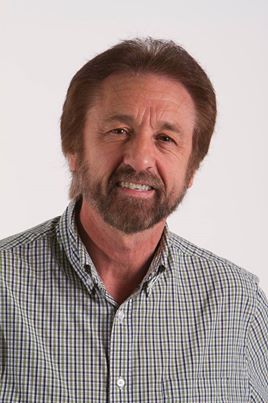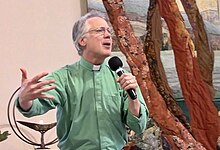
Theistic evolution, alternatively called evolutionary creationism, is a view that God acts and creates through laws of nature. Here, God is taken as the primary cause while natural causes are secondary, positing that the concept of God and religious beliefs are compatible with the findings of modern science, including evolution. Theistic evolution is not in itself a scientific theory, but includes a range of views about how science relates to religious beliefs and the extent to which God intervenes. It rejects the strict creationist doctrines of special creation, but can include beliefs such as creation of the human soul. Modern theistic evolution accepts the general scientific consensus on the age of the Earth, the age of the universe, the Big Bang, the origin of the Solar System, the origin of life, and evolution.

Charles Darwin's views on religion have been the subject of much interest and dispute. His pivotal work in the development of modern biology and evolution theory played a prominent part in debates about religion and science at the time. In the early 20th century, his contributions became a focus of the creation–evolution controversy in the United States.
The social effects of evolutionary thought have been considerable. As the scientific explanation of life's diversity has developed, it has often displaced alternative, sometimes very widely held, explanations. Because the theory of evolution includes an explanation of humanity's origins, it has had a profound impact on human societies. Some have vigorously denied acceptance of the scientific explanation due to its perceived religious implications. This has led to a vigorous conflict between creation and evolution in public education, primarily in the United States.

Ray Comfort is a New Zealand-born Christian minister, evangelist and young Earth creationist who lives in the United States. Comfort started Living Waters Publications, as well as the ministry The Way of the Master, in Bellflower, California, and has written several books.
Progressive Christianity represents a postmodern theological approach, which developed out of the liberal Christianity of the modern era, itself rooted in the Enlightenment's thinking. Progressive Christianity is a postliberal theological movement within Christianity that, in the words of Reverend Roger Wolsey, "seeks to reform the faith via the insights of post-modernism and a reclaiming of the truth beyond the verifiable historicity and factuality of the passages in the Bible by affirming the truths within the stories that may not have actually happened."
Liberal Christianity, also known as liberal theology and historically as Christian Modernism, is a movement that interprets Christian teaching by taking into consideration modern knowledge, science and ethics. It emphasizes the importance of reason and experience over doctrinal authority. Liberal Christians view their theology as an alternative to both atheistic rationalism and theologies based on traditional interpretations of external authority, such as the Bible or sacred tradition.

Michael Ruse is a British-born Canadian philosopher of science who specializes in the philosophy of biology and works on the relationship between science and religion, the creation–evolution controversy, and the demarcation problem within science. Ruse currently teaches at Florida State University.

The Catholic Church holds no official position on the theory of creation or evolution, leaving the specifics of either theistic evolution or literal creationism to the individual within certain parameters established by the Church. According to the Catechism of the Catholic Church, any believer may accept either literal or special creation within the period of an actual six-day, twenty-four-hour period, or they may accept the belief that the earth evolved over time under the guidance of God. Catholicism holds that God initiated and continued the process of his creation, that Adam and Eve were real people, and that all humans, whether specially created or evolved, have and have always had specially created souls for each individual.

Thomas Berry, CP was a Catholic priest, cultural historian, and scholar of the world's religions, especially Asian traditions. Later, as he studied Earth history and evolution, he called himself a "geologian".

Brian D. McLaren is an author, speaker, activist, public theologian and was a leading figure in the emerging church movement. McLaren is often associated with postmodern Christianity.

Richard Rohr, is an American Franciscan priest and writer on spirituality based in Albuquerque, New Mexico. He was ordained to the priesthood in the Roman Catholic Church in 1970, founded the New Jerusalem Community in Cincinnati in 1971, and the Center for Action and Contemplation in Albuquerque in 1987. In 2011, PBS called him "one of the most popular spirituality authors and speakers in the world".
Doomer and, by extension, doomerism, are terms which arose primarily on the Internet to describe people who are extremely pessimistic or fatalistic about global problems such as overpopulation, peak oil, climate change, ecological overshoot, pollution, nuclear weapons, and runaway artificial intelligence. Some doomers assert that there is a possibility these problems will bring about human extinction.
In social, cultural, and religious studies in the United States, the "epic of evolution" is a narrative that blends religious and scientific views of cosmic, biological, and sociocultural evolution in a mythological manner. According to The Encyclopedia of Religion and Nature, an "epic of evolution" encompasses
the 14 billion year narrative of cosmic, planetary, life, and cultural evolution—told in sacred ways. Not only does it bridge mainstream science and a diversity of religious traditions; if skillfully told, it makes the science story memorable and deeply meaningful, while enriching one's religious faith or secular outlook.

Rejection of evolution by religious groups, sometimes called creation–evolution controversy, has a long history. In response to theories developed by scientists, some religious individuals and organizations question the legitimacy of scientific ideas that contradicted the young earth pseudoscientific interpretation of the creation account in Genesis.

Why Darwin Matters: The Case Against Intelligent Design is a 2006 book by Michael Shermer, an author, publisher, and historian of science. Shermer examines the theory of evolution and the arguments presented against it. He demonstrates that the theory is very robust and is based on a convergence of evidence from a number of different branches of science. The attacks against it are, for the most part, very simplistic and easily demolished. He discusses how evolution and other branches of science can coexist with religious beliefs. He describes how he and Darwin both started out as creationists and how their thinking changed over time. He examines current attitudes towards evolution and science in general. He finds that in many cases the problem people have is not with the facts about evolution but with their ideas of what it implies.
Non-overlapping magisteria (NOMA) is the view, advocated by paleontologist Stephen Jay Gould, that science and religion each represent different areas of inquiry, fact vs. values, so there is a difference between the "nets" over which they have "a legitimate magisterium, or domain of teaching authority", and the two domains do not overlap. He suggests, with examples, that "NOMA enjoys strong and fully explicit support, even from the primary cultural stereotypes of hard-line traditionalism" and that it is "a sound position of general consensus, established by long struggle among people of goodwill in both magisteria." Some have criticized the idea or suggested limitations to it, and there continues to be disagreement over where the boundaries between the two magisteria should be.

The Blackwell Companion to Science and Christianity is a reference work in science and religion, edited by James B. Stump and Alan G. Padgett, and published by Wiley-Blackwell in 2012. It contains 54 new essays written by an international list of 55 authors, many of them leading scholars in the discipline of science and religion, and others new or up-and-coming voices in the field. The editors claim, "We are seeking to introduce and advance serious thinking and talking about science and Christianity, particularly as they interconnect. We are reflecting on the work of scientists and theologians, trying to find points of contact and points of tension which help to illuminate these practices and doctrines in clear, scholarly light." The book has received positive reviews in Choice, Reference Reviews, Themelios and Perspectives on Science and Christian Faith. The article by Sean M. Carroll generated significant attention when it was discussed on the Huffington Post.
Although biological evolution has been vocally opposed by some religious groups, many other groups accept the scientific position, sometimes with additions to allow for theological considerations. The positions of such groups are described by terms including "theistic evolution", "theistic evolutionism" or "evolutionary creation". Of all the religious groups included on the chart, Buddhists are the most accepting of evolution. Theistic evolutionists believe that there is a God, that God is the creator of the material universe and all life within, and that biological evolution is a natural process within that creation. Evolution, according to this view, is simply a tool that God employed to develop human life. According to the American Scientific Affiliation, a Christian organization of scientists:
A theory of theistic evolution (TE) — also called evolutionary creation — proposes that God's method of creation was to cleverly design a universe in which everything would naturally evolve. Usually the "evolution" in "theistic evolution" means Total Evolution — astronomical evolution and geological evolution plus chemical evolution and biological evolution — but it can refer only to biological evolution.

Jem Bendell is an emeritus professor of sustainability leadership with the University of Cumbria in the UK. He is best known for originating in 2018 the concept of "deep adaptation" for individuals and communities anticipating the consequences of ongoing climate change. In 2019 he founded the Deep Adaptation Forum to support peer-to-peer communications in developing positive responses at the individual and community levels to societal disruptions induced by climate change.
Postdoom, also post-doom, is a concept articulated by Michael Dowd in 2019 in his quest to "find the gift" beyond mere acceptance that ongoing climate change would inevitably lead to civilizational collapse. As Dowd reflected in a 2022 essay, "Denial, anger, bargaining, depression, acceptance: where are you in the vaunted stages of grief? And is doom automatically the end point?" He continued, "I began to explore the possibility of compassionate 'post-doom' forms of awareness." By the time of his death, Dowd had conducted more than fifty conversations with colleagues exploring the topic of post-doom, which are documented online in both video and audio formats.










